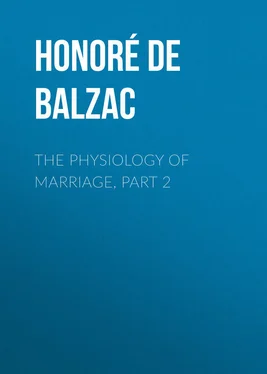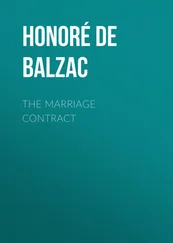Honoré Balzac - The Physiology of Marriage, Part 2
Здесь есть возможность читать онлайн «Honoré Balzac - The Physiology of Marriage, Part 2» — ознакомительный отрывок электронной книги совершенно бесплатно, а после прочтения отрывка купить полную версию. В некоторых случаях можно слушать аудио, скачать через торрент в формате fb2 и присутствует краткое содержание. Жанр: literature_19, foreign_antique, foreign_prose, на английском языке. Описание произведения, (предисловие) а так же отзывы посетителей доступны на портале библиотеки ЛибКат.
- Название:The Physiology of Marriage, Part 2
- Автор:
- Жанр:
- Год:неизвестен
- ISBN:нет данных
- Рейтинг книги:4 / 5. Голосов: 1
-
Избранное:Добавить в избранное
- Отзывы:
-
Ваша оценка:
- 80
- 1
- 2
- 3
- 4
- 5
The Physiology of Marriage, Part 2: краткое содержание, описание и аннотация
Предлагаем к чтению аннотацию, описание, краткое содержание или предисловие (зависит от того, что написал сам автор книги «The Physiology of Marriage, Part 2»). Если вы не нашли необходимую информацию о книге — напишите в комментариях, мы постараемся отыскать её.
The Physiology of Marriage, Part 2 — читать онлайн ознакомительный отрывок
Ниже представлен текст книги, разбитый по страницам. Система сохранения места последней прочитанной страницы, позволяет с удобством читать онлайн бесплатно книгу «The Physiology of Marriage, Part 2», без необходимости каждый раз заново искать на чём Вы остановились. Поставьте закладку, и сможете в любой момент перейти на страницу, на которой закончили чтение.
Интервал:
Закладка:
Honoré de Balzac
The Physiology of Marriage, Part 2
MEANS OF DEFENCE, INTERIOR AND EXTERIOR
"To be or not to be,
That is the question."
MEDITATION X
When a man reaches the position in which the first part of this book sets him, we suppose that the idea of his wife being possessed by another makes his heart beat, and rekindles his passion, either by an appeal to his amour propre , his egotism, or his self-interest, for unless he is still on his wife's side, he must be one of the lowest of men and deserves his fate.
In this trying moment it is very difficult for a husband to avoid making mistakes; for, with regard to most men, the art of ruling a wife is even less known than that of judiciously choosing one. However, marital policy consists chiefly in the practical application of three principles which should be the soul of your conduct. The first is never to believe what a woman says; the second, always to look for the spirit without dwelling too much upon the letter of her actions; and the third, not to forget that a woman is never so garrulous as when she holds her tongue, and is never working with more energy than when she keeps quiet.
From the moment that your suspicions are aroused, you ought to be like a man mounted on a tricky horse, who always watches the ears of the beast, in fear of being thrown from the saddle.
But art consists not so much in the knowledge of principles, as in the manner of applying them; to reveal them to ignorant people is to put a razor in the hand of a monkey. Moreover, the first and most vital of your duties consists in perpetual dissimulation, an accomplishment in which most husbands are sadly lacking. In detecting the symptoms of minotaurism a little too plainly marked in the conduct of their wives, most men at once indulge in the most insulting suspicions. Their minds contract a tinge of bitterness which manifests itself in their conversation, and in their manners; and the alarm which fills their heart, like the gas flame in a glass globe, lights up their countenances so plainly, that it accounts for their conduct.
Now a woman, who has twelve hours more than you have each day to reflect and to study you, reads the suspicion written upon your face at the very moment that it arises. She will never forget this gratuitous insult. Nothing can ever remedy that. All is now said and done, and the very next day, if she has opportunity, she will join the ranks of inconsistent women.
You ought then to begin under these circumstances to affect towards your wife the same boundless confidence that you have hitherto had in her. If you begin to lull her anxieties by honeyed words, you are lost, she will not believe you; for she has her policy as you have yours. Now there is as much need for tact as for kindliness in your behavior, in order to inculcate in her, without her knowing it, a feeling of security, which will lead her to lay back her ears, and prevent you from using rein or spur at the wrong moment.
But how can we compare a horse, the frankest of all animals, to a being, the flashes of whose thought, and the movements of whose impulses render her at moments more prudent than the Servite Fra-Paolo, the most terrible adviser that the Ten at Venice ever had; more deceitful than a king; more adroit than Louis XI; more profound than Machiavelli; as sophistical as Hobbes; as acute as Voltaire; as pliant as the fiancee of Mamolin; and distrustful of no one in the whole wide world but you?
Moreover, to this dissimulation, by means of which the springs that move your conduct ought to be made as invisible as those that move the world, must be added absolute self-control. That diplomatic imperturbability, so boasted of by Talleyrand, must be the least of your qualities; his exquisite politeness and the grace of his manners must distinguish your conversation. The professor here expressly forbids you to use your whip, if you would obtain complete control over your gentle Andalusian steed.
LXI.
If a man strike his mistress it is a self-inflicted wound; but if he strike his wife it is suicide!
How can we think of a government without police, an action without force, a power without weapons? – Now this is exactly the problem which we shall try to solve in our future meditations. But first we must submit two preliminary observations. They will furnish us with two other theories concerning the application of all the mechanical means which we propose you should employ. An instance from life will refresh these arid and dry dissertations: the hearing of such a story will be like laying down a book, to work in the field.
In the year 1822, on a fine morning in the month of February, I was traversing the boulevards of Paris, from the quiet circles of the Marais to the fashionable quarters of the Chaussee-d'Antin, and I observed for the first time, not without a certain philosophic joy, the diversity of physiognomy and the varieties of costume which, from the Rue du Pas-de-la-Mule even to the Madeleine, made each portion of the boulevard a world of itself, and this whole zone of Paris, a grand panorama of manners. Having at that time no idea of what the world was, and little thinking that one day I should have the audacity to set myself up as a legislator on marriage, I was going to take lunch at the house of a college friend, who was perhaps too early in life afflicted with a wife and two children. My former professor of mathematics lived at a short distance from the house of my college friend, and I promised myself the pleasure of a visit to this worthy mathematician before indulging my appetite for the dainties of friendship. I accordingly made my way to the heart of a study, where everything was covered with a dust which bore witness to the lofty abstraction of the scholar. But a surprise was in store for me there. I perceived a pretty woman seated on the arm of an easy chair, as if mounted on an English horse; her face took on the look of conventional surprise worn by mistresses of the house towards those they do not know, but she did not disguise the expression of annoyance which, at my appearance, clouded her countenance with the thought that I was aware how ill-timed was my presence. My master, doubtless absorbed in an equation, had not yet raised his head; I therefore waved my right hand towards the young lady, like a fish moving his fin, and on tiptoe I retired with a mysterious smile which might be translated "I will not be the one to prevent him committing an act of infidelity to Urania." She nodded her head with one of those sudden gestures whose graceful vivacity is not to be translated into words.
"My good friend, don't go away," cried the geometrician. "This is my wife!"
I bowed for the second time! – Oh, Coulon! Why wert thou not present to applaud the only one of thy pupils who understood from that moment the expression, "anacreontic," as applied to a bow? – The effect must have been very overwhelming; for Madame the Professoress, as the Germans say, rose hurriedly as if to go, making me a slight bow which seemed to say: "Adorable! – " Her husband stopped her, saying:
"Don't go, my child, this is one of my pupils."
The young woman bent her head towards the scholar as a bird perched on a bough stretches its neck to pick up a seed.
"It is not possible," said the husband, heaving a sigh, "and I am going to prove it to you by A plus B."
"Let us drop that, sir, I beg you," she answered, pointing with a wink to me.
If it had been a problem in algebra, my master would have understood this look, but it was Chinese to him, and so he went on.
"Look here, child, I constitute you judge in the matter; our income is ten thousand francs."
Читать дальшеИнтервал:
Закладка:
Похожие книги на «The Physiology of Marriage, Part 2»
Представляем Вашему вниманию похожие книги на «The Physiology of Marriage, Part 2» списком для выбора. Мы отобрали схожую по названию и смыслу литературу в надежде предоставить читателям больше вариантов отыскать новые, интересные, ещё непрочитанные произведения.
Обсуждение, отзывы о книге «The Physiology of Marriage, Part 2» и просто собственные мнения читателей. Оставьте ваши комментарии, напишите, что Вы думаете о произведении, его смысле или главных героях. Укажите что конкретно понравилось, а что нет, и почему Вы так считаете.












